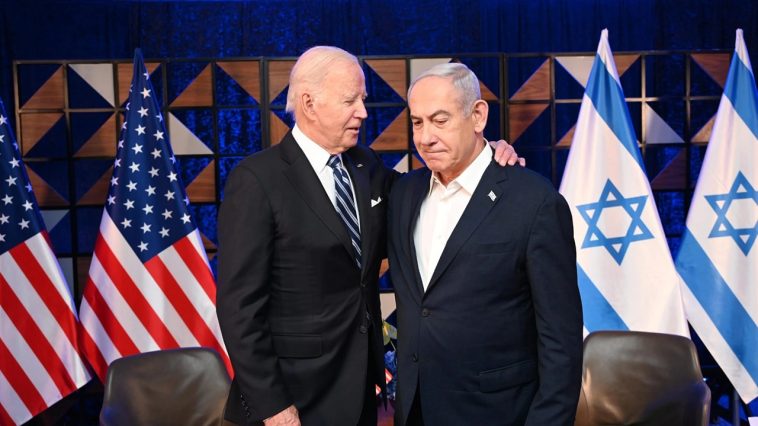LISTEN HERE:
U.S. President Joe Biden’s recent visit to Israel during the ongoing conflict between Israel and Hamas has stirred considerable attention and debate. His decision to fly into Tel Aviv just a day after a tragic hospital bombing in Gaza City, which led to the loss of hundreds of Palestinian lives, has generated a strong reaction in the Arab world.
By offering aid to both Palestinians suffering under an Israeli siege and supporting Israel’s fight against Hamas, President Biden has positioned himself in the center of this complex issue, aiming to shape their actions for the better.
President Biden believes that by consoling, negotiating with, and aiding Israel, he can exert the most influence over their decisions. His plans to swiftly push for additional aid for Israel, amounting to billions of dollars, have already sparked debates on the use of U.S. taxpayer funds.
Furthermore, the U.S.’s veto of a U.N. resolution calling for a ceasefire has drawn criticism from some of our allies. In a bid to alleviate the humanitarian crisis, President Biden has committed $100 million in new funding for humanitarian aid in Gaza and the occupied West Bank, while urging Israel to allow further assistance to reach Palestinians.
While President Biden’s intentions are clear, he recognizes the need to effectively communicate his Israel policy to the American people. To address this, he has planned a prime time White House address, scheduled for Thursday. In this address, he will discuss how the U.S. is responding to Hamas’ terrorist attacks against Israel and Russia’s ongoing brutal war against Ukraine.
Shortly after departing Tel Aviv, President Biden held an on-the-record press briefing on Air Force One, where he informed journalists about his coordination with Egyptian President Abdel Fattah al-Sisi to open the Rafah crossing for humanitarian aid to Gaza.
As the conflict continues and the possibility of a ground invasion grows, President Biden faces the challenge of maintaining credibility while minimizing civilian casualties. Critics argue that Israel has not adhered to the law of armed conflict, raising concerns among some Americans.
However, a recent Reuters/Ipsos poll suggests that a strong majority of Americans, including both Democrats and Republicans, support U.S. diplomatic efforts to provide a safe haven for Gaza residents fleeing the violence.
Only a fraction of respondents felt the U.S. should support the Palestinians, while less than half agreed that the U.S. should support Israel in the conflict with Hamas.
The situation in the region poses significant risks to years of diplomatic work aimed at fostering better relations with Arab and Muslim nations, from Turkey to Saudi Arabia, Egypt to Qatar. These efforts were driven by the hope that stronger ties would enhance Israel’s security, counter U.S. adversaries like Tehran, Moscow, and Beijing, and stabilize U.S. gas prices.
Unfortunately, President Biden’s current focus on managing this escalating crisis has put the diplomacy to normalize ties between Saudi Arabia and Israel on hold. The hope remains that he can prevent the situation from spiraling out of control and avoid a direct confrontation with Iran, a delicate balancing act that comes with the office of the presidency.
In typical fashion, Joe Biden finds himself making a risky bet as he takes on the challenging situation in the Middle East. Only time will tell how this high-stakes gamble will play out, but in the meantime, the world is closely watching his actions and waiting for the outcome.


